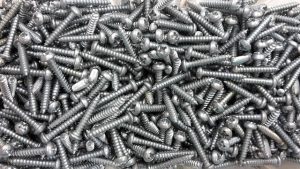
Choosing screws made of the right material is important when fastening aluminum panels. While they all feature a partially or fully threaded shank, screws are available in different materials. Some of them are made of stainless steel. Other screws are made of aluminum, brass or even titanium. Stainless steel screws, however, have been known to corrode aluminum panels.
Why Stainless Steel Screws Corrode Aluminum Panels
Stainless steel screws can corrode aluminum panels due to galvanic corrosion. Aluminum and stainless steel are dissimilar metals, meaning they have different electrochemical properties. Galvanic corrosion is a phenomenon that involves an electrochemical reaction between two or more dissimilar metals when those metals are in direct contact and an electrolyte is present.
Using stainless steel screws to fasten aluminum panels can result in galvanic corrosion. Assuming they are in direct contact — and an electrolyte like water is present — the stainless steel screws and aluminum panels will react to each other. This reaction can cause corrosion around the point or points of contact.
If left unchecked, galvanic corrosion can lead to the following:
- Weakening or failure of fastened joints
- Metal degradation
- Stripped screw threads
- Air or fluid leaks
- Loss of panel integrity
Ways to Use Stainless Screws With Aluminum Panels
While stainless steel screws can corrode aluminum panels, there are ways to prevent this phenomenon. Choosing screws with a coating, for instance, can prevent galvanic corrosion. For galvanic corrosion to occur, two or more dissimilar metals must touch each other. If a screw has a coating, such a zinc or oxide coating, it will act as a barrier to prevent the underlying steel from touching the aluminum panels.
Another solution is to use washers. There are insulating washers, for instance, that can create a barrier between the steel and aluminum. Insulating washers will prevent the two metals from touching so that galvanic corrosion doesn’t occur.
Keeping the fastened joints dry can minimize the risk of corrosion. Galvanic corrosion needs an electrolyte, with water being the most common. As long as the screws and panels remain dry, there should be little or no galvanic corrosion.
In Conclusion
Stainless steel screws offer strength and durability, but they pose a risk when used with aluminum panels due to galvanic corrosion. Fortunately, this risk isn’t unavoidable. With the right precautions, such as applying protective coatings, using insulating washers or keeping joints dry, you can safely combine stainless steel fasteners with aluminum materials.



